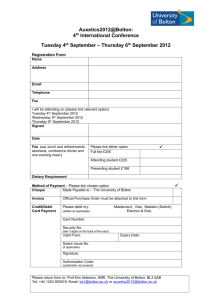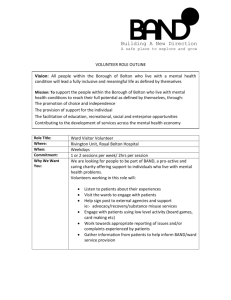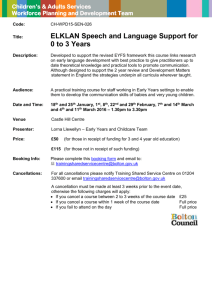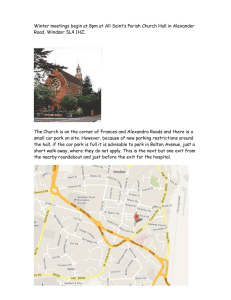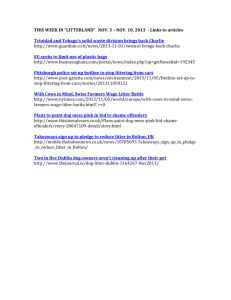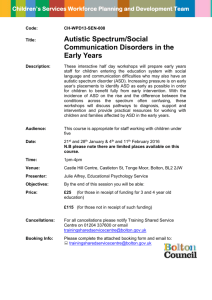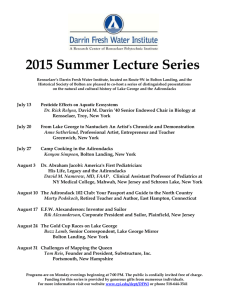Then - Bolton FM
advertisement
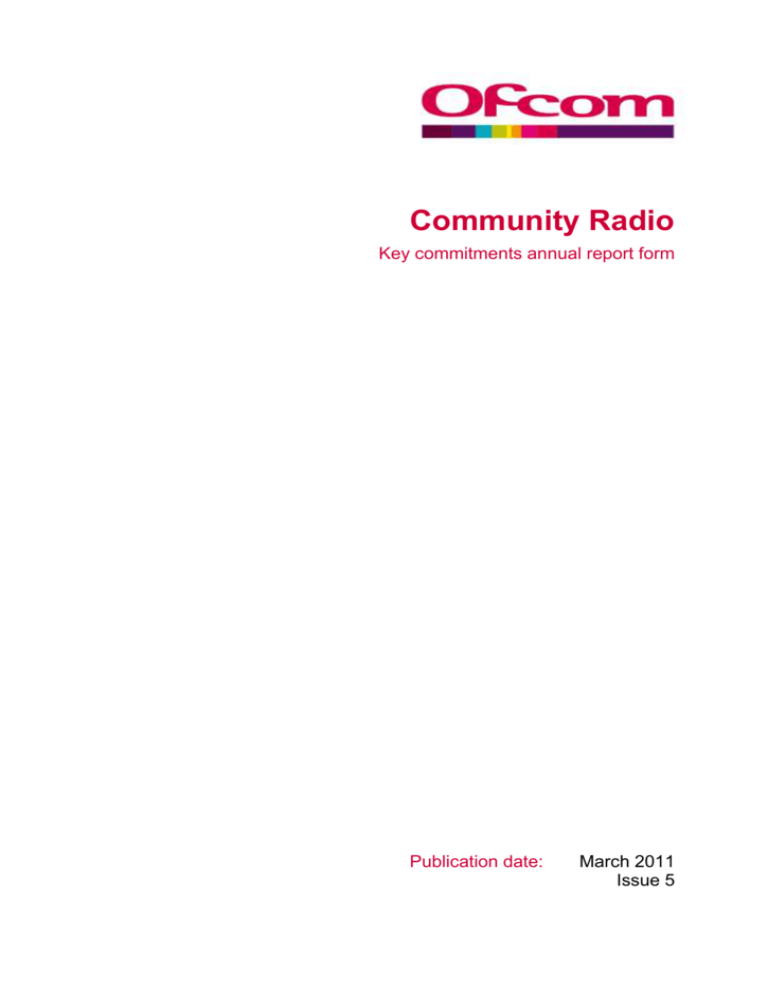
Community Radio Key commitments annual report form Publication date: March 2011 Issue 5 Contents Section 1 Community Radio Annual Report Form 2 Declaration 3 Checklist Page Section 1 1 Community Radio Annual Report Form 1.1 Community Radio Annual Report Form: Year Ending 31 March 2010 Station details Licence Number CR163 Station Name Bolton FM (CIC) Launch Date 20th June 2009 Web address where you will publish this report The report will be published at http://www.boltonfm.com in June/July 2011 once the website has been redesigned. PLEASE NOTE: Each section can be expanded to take as much information as you need to provide. 1 1.2 The year in numbers Please specify the station’s achievements in the 10/11 year in numbers as follows: Average number of live hours per week Average number of original programming hours per week (this may include pre-recorded as well as live material but should not include repeats). The percentage of your live daytime output that is speech Number of people trained over the course of the year Number of volunteers involved over the course of the year If appropriate, a list of languages you have broadcast in 92 128 28% 62 (Retained 46) 84 English (Please also include this information in the following sections where relevant) 1.3 Key commitments: Programming Daytime output will typically comprise 70% music and 30% speech (‘speech’ excludes advertising, programme/promotional trails and sponsor credits). Music output will comprise a range of styles including folk, jazz, brass, classical, country, rock, soul, reggae; mainstream music from the 1950s to the present; contemporary local electronic/dance/mc; Asian, African, West Indian and other BME both contemporary & traditional and also local music. Speech output will include interviews and guests, panels/ discussion, news or news related programming, phone ins, documentaries and drama/ arts. The majority of output will be in English, with programming in other community languages dependent on community demand and the availability of volunteers. The service will typically be live for at least 8 hours per day. (Live programming may include pre-recorded inserts, if applicable). The majority of the output will be locally produced. We broadcast twenty-four hours a day, seven days a week. Of the 168 hours, the station is on air, only 40 hours is either automated or bought-in from external sources. Our live output averages 92 hours per week and is produced locally in its entirety Within the reporting period daytime output averages 72% music and 28% speech between 7am to 7pm. We currently expect 30% speech output within the next year. In specialist shows, which air after 7pm until midnight, speech content is significantly more. Taken over a 24-hour period we believe that we comfortably exceed 30% speech output. 2 Our mainstream music output spans the 1950’s to the latest releases across a range of music styles. We have specialist shows that cover specific genres such as jazz, swing, club, local and rock music. We are exploring the feasibility of other specialist shows for example, soul and country and other BME shows, but this depends on the availability of appropriate volunteers, for example we now provide a show focused on Asian music and the Asian community called “Asian Matters”. In the reporting period we have completed 172 interviews; held political panels with the major parties in the build up to the general and local elections; we take international news from IRN hourly; cover local news on the half hour as part of our breakfast and drivetime shows The majority of output is in English, with programming in other languages dependent on demand and the availability of volunteers. 1.4 Key commitments: Social gain objectives “(a) the provision of sound broadcasting services to individuals who are otherwise underserved” The station will serve the people of Bolton, with particular consideration for older people, BME groups, schools and youth groups, social housing residents, people with disabilities and those in deprived communities. “(b) the facilitation of discussion and the expression of opinion” Bolton FM will provide a wide range of speech - based programmes encouraging active participation at all levels. Open debate and discussion will be encouraged during these shows and guests from the community will be represented on discussion panels. Programmes will be made by and for local people and the agenda will be set by the programme makers themselves. “(c) the provision (whether by means of programmes included in the service or otherwise) of education or training to individuals not employed by the person providing the service” Training will be made available and accessible to any individual or group seeking to be involved in Bolton FM. Training will cover radio skills and other topics relevant to community broadcasting. Bolton FM will train around 60 volunteers each year. Training will be offered onsite and also taken out to various community locations. There will be a skills audit for all volunteers and they will be supported to take up opportunities, encouraging progression wherever possible. Bolton FM will offer 8 work experience placements per year on a regular rotating scheme. Training and development opportunities will also be made available to Bolton FM’s listeners through educational programming “(d) the better understanding of the particular community and the strengthening of the links within it” Bolton FM will publicise cross-community events and will endeavour to have an active 3 presence at such events. Cross-community programming will highlight events and initiatives which aim to increase social cohesion and break down barriers. The service will not only air issues of importance raised by individuals, but will also connect them to the available bodies to help address their issues. Additional social gain objectives: Bolton FM will provide relevant information on local services and access to them. It will provide on-air information and guidance about enterprise development. It intends developing programming with agencies dealing with employment, training and signposting and will also provide referral and signposting to such organisations. Bolton FM will provide positive images and representation of diverse communities, and will raise awareness of the positive contribution made by members of diverse communities including migrants, disabled people, older people and younger people. Bolton FM will seek to raise cultural awareness via cultural programming and community language shows, as well as informed discussion on mainstream magazine shows. Bolton FM will also actively promote volunteering on air and celebrate the achievements of those who actively contribute to community life in Bolton, encouraging further participation and promoting opportunities for involvement. We have proactively looked to establish and successfully maintain relationships and partnerships with organisations that operate in the town, within the region and nationally so that we can successfully serve the people of Bolton. For example, we have established and maintained good working relationships with Bolton Council, Bolton Hospice, Bolton Lads and Girls Club, Bolton College, the University of Bolton and Bolton Wandereres Football Club. These relationships ensure that we are seen as part of the ongoing and continuing development to make Bolton a better place in which to live and work. 4 We have a particularly strong relationship with Age Concern, whose chair is a Director of Bolton FM, ensuring that their services and facilities are promoted effectively and efficiently to senior citizens in the town. To further ensure the health and wellbeing of our listeners we have worked with both the Primary Care Trust and National Health Service. For example, we issue health updates like the flu epidemic and extreme weather warnings and when informed by Greater Manchester Police warn about ‘bogus callers’, Bolton FM’s station chaplain provides us with strong links into Bolton’s Interfaith Council, this has positioned us to have good relationships with the BME community. This is best evidenced by our roadshows and outside broadcasts that have been targetted specifically for the BME community. Such as the ‘Halliwell Respect Me, Respect You’ community event which focuses on community cohesion in the community. Our station chaplain also has a regular show called ‘Spirit of Bolton’ which is open to all faiths to participate in, we also have a daily ‘It’s the Thought That Counts’ which delivers positive messages on the social cohesion of faiths and communities across the town. Finally, one of our Directors is a member of BRASS (Bolton Refugees and Aslyum Seekers Service ) which allows us to help them meet their objectives in the town. We have established relationships with the majority of primary and secondary schools across the Borough including awareness talks ahead of a Christmas Carol competition in winter 2009, which involved 22 schools. We also provided 17 work experience places for school pupils giving them a basic understanding of broadcast techniques and how a radio station works and experience within a workplace. Based on these successes we have delivered other school-specific competitions and provided weather updates for schools during last winter, this resulted in over 5,000 visits to our website from parents and pupils. We have a good relationship with Bolton at Home, the largest provider of social housing in the borough, which allows us to involve residents and communities within this demographic. Our aim through this relationship is to build self-esteem and social responsibility by empowering communities to act for themselves by using the medium of radio. Our main points of access to these communities are through our outreach work and via the Urban Care and Network centres across the town. We actively encourage speech-based programmes and regularly interview local councillors, members of parliament, and executive members of the council as well as people from mainstream media. The leaders of the town’s three political parties are always available to discuss and inform on political issues that are of particular relevance to our listeners and we have a regular audience with the Mayor. In the build up to both the local and general elections, we held discussion panels and interviews with the prospective councillors and members of parliament giving our listeners the opportunity to question candidates directly on issues and policies that directly affected them. There is no doubt that, through this work, Bolton Council sees us as a key partner in the civic calendar of the town; as a result, we are a key communication element of Bolton Council’s Vision for the Future partnership. Bolton Lads and Girls Club, the largest young persons club in the United Kingdom, use Bolton FM to raise awareness of the club and we support them actively in meeting their objectives. For example, we regularly interview BLGC volunteers and staff members on our shows to assist them in achieving their objectives. DBBC - Diversity in Barrier-Breaking Communications – our training partner enables us to help develop our volunteers through both accredited and informal training. Volunteers are trained in the aspects and capacity in which they wish to be involved. We have also sent some volunteers to boot camps organised by the BBC. In this reporting period, we trained 62 volunteers. We continue to advertise and actively participate in community events from across the Borough working with all our partners on the community cohesion agenda and have helped raise awareness of Mela, Diwali and Easter festivals. Shows like “This is Bolton”,”Bolton FM Meets” and “Community Corner” all provide a 5 platform for the discussion of issues, which affect the entire Bolton Community. Our daily ‘What’s On Guide’ provides information on a full range of activities and facilities that are available to everyone in Bolton. 1.5 We actively promote volunteering on air both with the station and with other opportunities across the town and celebrate the achievements and successes of those who actively contribute to community life in Bolton. Key commitments: Access and participation Community Radio Order 2004: “It is a characteristic of every community radio service that members of the community it is intended to serve are given opportunities to participate in the operation and management of the service.” Bolton FM will have a programme of regular publicity and outreach work to ensure that members of it target communities are aware of the opportunities available. The station will involve at least 60 volunteers a year and aims to recruit from all sections of the target community reflecting the ethnicity of the Bolton area. Bolton FM will provide training for 10 programming teams that will support and develop the stations broadcast schedule. The station will encourage representatives from diverse community organisations and interested individuals to join the Bolton FM steering group. We have a programme of regular publicity and outreach work to ensure that members of our target communities are aware of the opportunities available. In this reporting year we have been particularly active in some of the more deprived boroughs in the town, through our What’s On Guide and outside broadcasts. Our volunteers are recruited from all sections of the Bolton family and range in age from 16 to 75 years of age. This year we have trained 62 volunteers of which 46 are continuing with the station. In maintaining our production output standards we ensure that all our volunteer presenters are supported appropriately with, for cost purposes, most producing their own shows. Production teams are in place for our sports, current affairs and faith based shows. Informal support networks exist between presenters of specialist and branded shows like “Bolton FM’s Release”. The station does encourage representatives from diverse community organisations and interested individuals to join Bolton FM. We continue to try to attract volunteers from across the town, however in the current economic environment this is becoming increasingly difficult for people to give up their spare time. 6 1.6 Key commitments: Accountability to the target community Community Radio Order 2004: “It is a characteristic of every community radio service that, in respect of the provision of that service, the person providing the service makes himself accountable to the community that the service is intended to serve.” Board members will be elected by the wider Bolton FM membership at the AGM. There will be a regular rotation of Board members with on-going training, development, mentoring and support provided for new board members. Bolton FM will encourage representatives from diverse community organisations and interested individuals to join the Bolton FM steering group. The steering group will ensure that Bolton Fm is relevant and accountable to its target audience both in terms of broadcast output and the off-air resources and opportunities offered. The steering group meets quarterly, feeding back opinion and information directly to the Bolton FM board. The terms of reference and membership of this group will be reviewed regularly to ensure that they are appropriate. Where feedback cannot be acted upon, this will be reported back to the steering group by the Chair. Open meetings will be held regularly for all Bolton FM volunteers to have their say and be kept informed of issues. Issues raised by volunteers will be fed back directly to the board by the station manager. Listener feedback will be pro-actively sought on-air and via the website or through direct contact with the station staff and volunteers. An annual public questionnaire will be issued and widely distributed via publication in local media. The station will aim to make the questionnaire, other important publications and on-air broadcast campaigns available in the most common community languages of Bolton. The station will produce an annual report The station will have a published complaints procedure. We seek listener feedback on-air, through the website and through direct contact with station staff and volunteers. Financial and logistical difficulties mean that an annual public questionnaire is not practical on a cost basis at this moment in time. However, we do seek qualitative feedback at our regular road shows and we have sought feedback through Bolton Scene a local Council publication that is delivered to 98% of households in Bolton. We aim to make the questionnaire, other important publications and on-air broadcast campaigns available in the most common community languages of Bolton, but this is heavily reliant on having appropriately skilled volunteers and the cost implications/benefit analysis. Board members are elected by the wider Bolton FM membership at the Annual General Meeting (AGM). This is documented in the station’s Articles of Association. Board Members are rotated regularly, and on-going training, development, mentoring and support provided for new board members. During the reporting period the Bolton FM steering group has lapsed due to a change in circumstance for those involved, including the chair, however we are looking to reconstitute the group. We are encouraging representatives from diverse community organisations and interested individuals to join the steering group. When reconstituted the steering group will ensure that the station is relevant and accountable to its target 7 audience both in terms of broadcast output and the off-air resources and opportunities offered. Currently this role is undertaken by the Executive Group. There is no doubt that the current economic straits is affecting our ability to reconstitute the Steering Group. All Volunteer Open Meetings are held regularly, allowing volunteers to have their say and kept informed of issues. The station manager feeds issues raised by volunteers back directly to the board. The station produces an annual report. (Attached). The station has a published complaints procedure. 1.7 Volunteer inputs (see the separate guidance notes) Number of volunteers: 84 What roles are performed by volunteers: All roles, except that of station manager, are staff by volunteers. Approximate number of hours worked on average per volunteer per week: On average four hours a week per volunteer. Additional information: Due to the current economic situation, and in order to operate at the lowest cost base possible, Bolton FM is currently a volunteer run and staffed organisation. The station manager is now no longer a paid position. 1.8 Significant achievements Considering we launched Bolton FM in the throes of economic turmoil to successfully survive and achieve what we have given the resources available to us means that we consider this our most significant success. The recognition by the civic leaders of Bolton, which means Bolton FM, is embedded in the civic life of the town, and regarded as significant communications outlet. The three local MPs recognise the station as a powerful medium with which to communicate with their constituents and electorate. In addition, the level of relationships we have established with organisations like Bolton Council, Greater Manchester Police and the National Health Service. The successful delivery of Bolton’s civic calendar in 2009 – the Christmas lights switch 8 on - where we attracted and engaged an audience in the region of 8-10,000. Bolton FM is regarded as a valued member of the “Bolton Family”, viz “Bolton FM the Voice of the Bolton Family”. Being voted “the UK’s Best Loved Radio Station” by the business-to-business network “Best Of”. Finalist for Best Community Business’ in the Bolton and Bury Business Awards for 2011. 1.9 Significant difficulties Do you wish this section to be kept confidential? No Bolton FM faces two significant difficulties. Firstly, our financial position, and the current economic climate, is a significant barrier to our continuing development. . Funding from the Council has been reduced, following Government spending cuts, and revenue from the private sector is down. This means that finances at the station are significantly squeezed and stretched. The second significant difficulty is the topography and twin-centre nature of the town. This means that the current transmitter does not cover the Borough and does not reach one of the major retail areas of the town or Bolton Wanderers’ Reebok Stadium. This inability to reach a third of the town, and its largest retail proposition, has a major impact on our ability to attract advertising revenue. Our financial situation has necessitated the removal of all paid posts within the station, so that we are now entirely run by volunteers. This in itself has presented particular challenges, which we are currently tackling. Another difficulty we have experienced in the reporting period is successfully bringing through volunteers from under represented groups at the station, while initial engagement was good there seems to be reluctance from some to undertake the necessary training to reach the level the station feels it needs to present on air. Volunteer retention is also difficult especially with our younger volunteers moving off to college and university. 9 1.10 Audience research Please provide a summary of any audience research/ data you have collected during the year. We would wish to undertake audience research completely and comprehensively, however budget constraints mean that this is not currently possible. However, listener feedback is sought on-air, through the website and through direct contact with station staff and volunteers. Financial and logistical difficulties mean that an annual public questionnaire is problematic. However, we do seek qualitative feedback at our regular road shows and we have sought feedback through Bolton Scene a local Council publication that is delivered to 98% of households in Bolton. Feedback from our listeners has resulted in changes to our mainstream music output and the introduction of new specialist shows such as the rock and Asian shows. Although we have made some changes to our broadcast output the research we have done suggest that the people of Bolton value greatly our efforts in our endeavour. At our Roadshows and on all outreach activities, we conduct informal straw polls amongst the audience; we are led to believe we are contacting 15-20,000 people in Bolton, with positive responses and support. We recognise the need to substantiate our audience perception levels as soon as possible. 10 Section 2 2 Declaration I hereby declare that the information given in this annual report is, to the best of my knowledge and belief, true and correct. Signature Name Position Station Email address Telephone number Date 11 Section 3 3 Checklist Please ensure that you have done the following: Read the Guidance Notes. Checked that all sections of both forms (i.e. this document and the accompanying spreadsheet) are completed. Ensured that the declaration is signed and dated by a member of the board of the corporate body which has been awarded the community radio licence, and that the person has the authority to act on behalf of the board. Then Submit your form by email to community.radio@ofcom.org.uk and send one signed hard copy to Community Radio (5th Floor), Ofcom Riverside House 2A Southwark Bridge Road, London SE1 9HA. Annual report forms must be returned to Ofcom by Wednesday 29 June 2011. March 2011 – Issue 5 12
